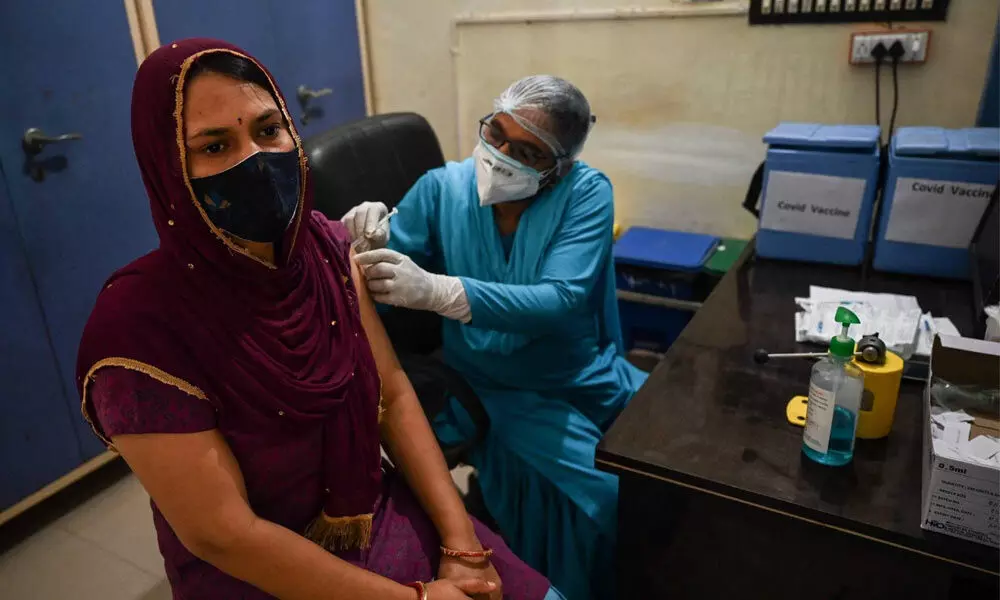Live
- Driverless Namma Metro nets revenue of `230 crore even before its launch
- Uber launches women-only bike rides in Bengaluru
- Allu Arjun Arrested in Shocking Sandhya Theater Incident! Here’s What Happened
- Allu Arjun Arrested in Sandhya Theatre Stampede Case
- Gemini Update: Search and Summarize Google Drive Folders Easily
- Air ambulance for health emergencies: Helipad to come up in Victoria Hospital
- Karthigai Deepam Wishes: WhatsApp Status, Messages to Celebrate the Festival of Light
- Top Different Industry Trends of 2024 and What to Expect in 2025
- India’s Leading Lending Platforms: How Technology is Transforming Credit Access
- WhatsApp Update: WhatsApp To Add an In-App Translation Feature
Just In
Defying gender bias: More women receive jabs in Andhra Pradesh than men


For representational purpose only
According to an estimate for the period up to July, more number of females got jabs than males in Andhra Pradesh in contrast to the national average where 143 million women were vaccinated as against 167 million men
Amaravati: India's Covid-19 vaccination drive is riddled with a gender bias where women are lagging behind in getting the protection from the virus. An estimate in July showed that out of the 309 million Covid vaccines delivered since January 2021, only 143 million were given to women as compared to 167 million given to men. However, Andhra Pradesh defied the norm. It is one of the very few states which was successful in vaccinating more women than men.
If percentages are taken into account, this gender gap is more than 6 per cent, it is said. While the gender gap varies in vaccines with Jammu and Kashmir, Delhi and Uttar Pradesh recording worst performance, Andhra Pradesh along with Kerala and Chhattisgarh had fared remarkably well.
The gender gap in vaccinations is directly proportional to not just to the skewed sex ratio but also to the gendered nature of healthcare itself. The National Family Health Survey (NFHS) points out that male members get the preference both in nutritional facts and healthcare while women have a secondary preference.
Women getting vaccinated is not easier, particularly in the rural households where they need their husbands' permission to go out. In such a scenario, for a woman to go out to a far away immunisation centre, without a male member of the family accompanying her, it is a greater challenge. The NFHS data says only 40 per cent of women are allowed to go out on their own in the country.
The fact sheet of NFHS provides information on key indicators and trends for Andhra Pradesh. The NFHS fieldwork for AP that was conducted in 2019 indicates that on an average there are 1,045 females for 1,000 males as far as the sex-ratio is concerned. While 96.7 per cent of households had improved drinking water facilities, 77.3 per cent had improved sanitation facilities. Households with electricity are 99.5 per cent.
Women who are literate are 79.0 per cent (Urban), 63.8 per cent (Rural), 68.6 per cent (of total). Women with 10 or more years of schooling are 51.2 per cent (Urban) 34.3 per cent (Rural) and 39.6 per cent (overall). Women who have ever used the internet are 33.9 per cent (Urban), 15.4 (Rural) and out of the total population, 21.0 per cent.
Literacy and technological access are two important issues in reducing gender discrimination and states like Andhra Pradesh and Kerala are doing far better than others because of the strides they have made in the sectors. In fact, the whole process of vaccination is so technology-driven that women will be behind men if they don't have access to a smartphone.
In contrast, data from two select districts of Delhi and Mumbai, considered having equal access to the internet, shows that men outnumbered women by 53 per cent and 23 per cent respectively. However, the reverse trend can be seen in 22 districts of Chhattisgarh, 13 in Kerala, 11 in Andhra Pradesh and seven in Uttarakhand.
States like Andhra Pradesh also proved that, apart from literacy, the role of ASHA workers and door to door campaigns also play a major role in overcoming the gender bias. Though the exact statistics are yet to be compiled as the process of vaccination is still going on, the survey points out that AP is less discriminatory to women in this regard.

© 2024 Hyderabad Media House Limited/The Hans India. All rights reserved. Powered by hocalwire.com






